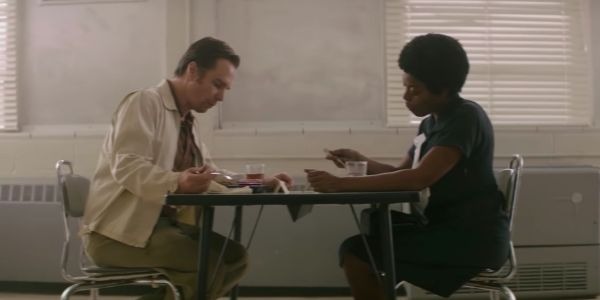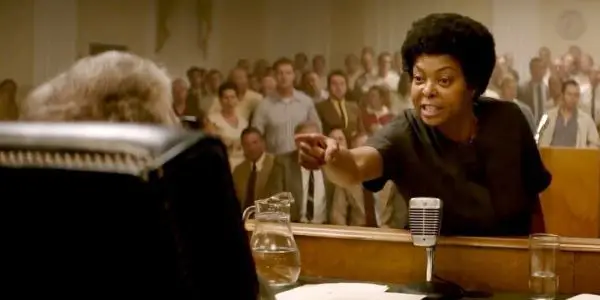THE BEST OF ENEMIES: A Complex Story Is Stifled

Alex is a film addict, TV aficionado, and book lover.…
Here we go again. The Best of Enemies is yet another movie about racism being overcome in the past, of prejudiced people learning their lesson, and a single triumph being used as an exemplar for how calming down and listening to each other can solve our problems. In and of itself, there’s absolutely nothing wrong with telling that story, but given the prevalence of these narratives and the lack of more hard-hitting examinations of race in (particularly American) films, these softballs have become tiresome to many.
A more dire take on this aspect of the cinema landscape is that it reflects our unwillingness to actually deal with racism, instead retreating into fantasies where small steps can change large, systemic problems. Or, even worse, they could contribute to the mythology of racism as a thing of the past.
It would be hard to hurl those more serious accusations at Best of Enemies, though, because it does have a bit more on its mind than the average film of this ilk. It plucks a little-known story of school integration in Durham, North Carolina, where local leaders of the KKK and a black activist group co-chair a charrette and become friends, and actually digs into the ramifications this shift had on both individuals. The film is aware of its time and place in a way that many are not, but in a cruel punishment, this ambition makes it too unwieldy to fit into the comfortable narrative it’s aiming for.
Refusing To Isolate Its Protagonists
The setting of Best of Enemies, a southern city in 1971, allows it to take on a complex moment in American history. The schools should have been integrated already, with the U.S. Supreme Court making segregated schools illegal (but not well enforced) in 1954, and while the American Civil Rights Movement was waning in the ‘70s, polarized battle lines were still going strong. This is the broader context that makes the pairing of Ann Atwater (Taraji P. Henson) and C.P. Ellis (Sam Rockwell) particularly tense (as well as, you know, her being a black woman and him being in the KKK). Both were deeply enmeshed in their local slice of nationwide issues, and their every flinch was noted and analyzed by friend and foe.

What this does for the film is require each character to not only confront their own prejudices but also contend with the expectations of those around them, resulting in actual consequences for their concessions. This is not a movie where the two get a little one-on-one time to sort things out. Instead, their tentative movements draw the expected response from intolerant members of their community, and somehow the film has to get these characters through this fraught terrain in a two hour narrative.
So how does writer/director Robin Bissell do it? Unfortunately, he doesn’t, at least not in a believable way. Everything is too rushed, and more quiet, reflective moments with both Atwater and Ellis were needed to show their perspectives shifting. Instead, the forces pressing down on them are highlighted and then tossed aside, infuriatingly hinting at the more robust story this could have been.
Juggling Leads
One of the critical things that make these historical racism stories so sinister is their focus on white characters, often relegating black characters to supporting players in their own political movement. Again, this would be fine if balanced against movies where the focus is reversed, but those simply don’t get made as often. So, paying attention to whether the arcs of white characters are equal to those of black characters becomes a bellwether for whether a the film is reinforcing the emphasis on white people in history or actually taking a progressive stance, and this is unfortunately another area where Best of Enemies comes up short.
It sets itself up as a two-hander, with Henson and Rockwell each taking solid swings at characters with hurdles to overcome. Slowly, though, Rockwell’s issues take center stage while Henson’s fall into the background, making it yet another movie primarily concerned with a white man’s reaction to civil rights issues.
This is partially understandable since there’s so many meaty things going on in Ellis’ journey. The film is more clear about the makeup of the KKK in the ’70s than many other movies, acknowledging the increased role that class and community played in the organization after its resurgence in the ’20s. It’s still quite clearly a hate group, but there’s other factors bonding its members together as well, which complicates Ellis’ extraction from the group.
But that doesn’t excuse the falloff of Atwater’s presence, who had a whole host of complicating issues in her own life that could’ve been highlighted. The choice to stick with Ellis, and to have Atwater literally applaud his eventual change of heart, makes it a particularly cringe-worthy example of the problems that plague this sort of film.
Core Incompetence
Even with a host of alarming elements, a well-told story of friendship making people better can be satisfying, but unfortunately Bissell’s inexperience gets in the way. This is his first time writing and directing, and making a film enjoyable enough to overcome its questionable elements seems to be out of his reach.

He doesn’t completely flub it; it’s clear that he understands the beats this story needs to hit, but a film needs some pizzazz, something to distract from the formula. Bissell never seems to find that, attempting to add in some old-school transitions and feathery soft lighting to evoke the time without using either consistently enough for the effect to sink it. Instead, it always feels like stylistic choices are simply being thrown around, and even more alarming, certain shots are blatantly out of focus (so much so that I question whether this was an issue with my particular showing). Even leaving the latter point aside, though, the bungled approach sinks any chance of the film lifting itself out of its own mess.
Conclusion: The Best of Enemies
A promising start quickly descends into troubling formula in The Best of Enemies, wasting two excellent lead performances and a story that could have taken us down innumerable interesting side paths. Instead, we are left with a rote and familiar movie which does nothing to stand out from the many others just like it.
What did you think of The Best of Enemies? Did it hit on anything that particularly sparked your interest? Let us know in the comments!
The Best of Enemies was released in the US on April 5th, 2019.
Does content like this matter to you?
Become a Member and support film journalism. Unlock access to all of Film Inquiry`s great articles. Join a community of like-minded readers who are passionate about cinema - get access to our private members Network, give back to independent filmmakers, and more.
Alex is a film addict, TV aficionado, and book lover. He's perfecting his cat dad energy.













